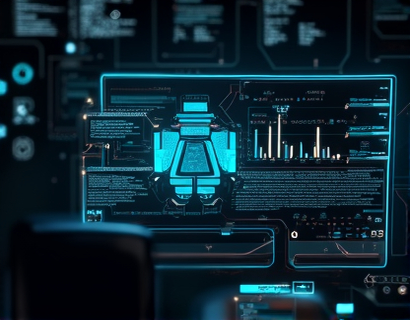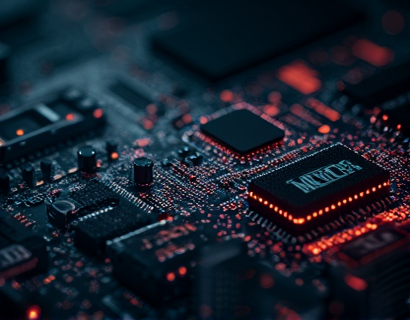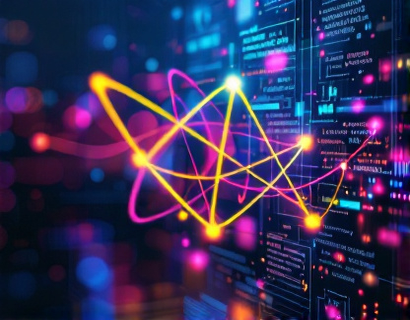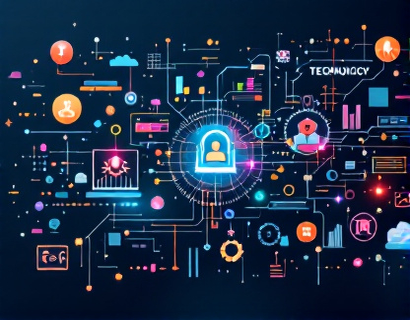Decentralized Innovation: Harnessing AI and Crypto for Revolutionary Digital Solutions
The intersection of artificial intelligence and cryptocurrency is giving rise to a new era of decentralized innovation, transforming the digital landscape in ways previously unimaginable. This convergence is not just about combining two powerful technologies but about creating a paradigm shift in how we approach digital solutions, user experience, and engagement. As we delve into this topic, it's essential to understand the foundational elements of both AI and cryptocurrency and how they synergize to drive next-generation digital transformation.
Understanding Artificial Intelligence
Artificial intelligence, or AI, refers to the simulation of human intelligence processes by machines, particularly computer systems. These processes include learning, reasoning, problem-solving, perception, and language understanding. AI technologies encompass a broad range of tools and techniques, from machine learning and deep learning to natural language processing and computer vision. The core idea is to enable machines to perform tasks that traditionally required human intervention, thereby enhancing efficiency, accuracy, and decision-making.
Machine learning, a subset of AI, involves algorithms that can learn from and make predictions based on data. Deep learning, an advanced form of machine learning, uses neural networks with multiple layers to model complex patterns in data. These technologies are the backbone of many modern applications, from recommendation systems to autonomous vehicles. The rapid advancement in AI is driven by increased computational power, larger datasets, and more sophisticated algorithms, making it a pivotal force in the tech industry.
Exploring Cryptocurrency
Cryptocurrency, on the other hand, is a digital or virtual currency that uses cryptography for security and operates on a decentralized network, typically a blockchain. The most well-known cryptocurrency is Bitcoin, but there are thousands of others, each with unique features and use cases. Cryptocurrencies are designed to be secure, transparent, and resistant to censorship, making them an attractive alternative to traditional financial systems.
The underlying technology, blockchain, is a distributed ledger that records transactions across multiple computers in such a way that the registered transactions cannot be altered retroactively. This decentralization ensures that no single entity has control over the network, reducing the risk of fraud and increasing trust among users. Blockchain's immutability and transparency are key attributes that make it a foundational technology for various decentralized applications.
Decentralized Innovation: The Synergy of AI and Crypto
The true power of decentralized innovation emerges when AI and cryptocurrency are combined. This synergy creates a new class of digital solutions that are not only more efficient and secure but also more user-centric and engaging. By leveraging the strengths of both technologies, developers can build systems that adapt, learn, and evolve in real-time, all while maintaining a high level of security and trust.
One of the primary benefits of this combination is the enhancement of user experience. AI can analyze vast amounts of data to understand user preferences and behaviors, allowing for personalized and intuitive interactions. In the context of decentralized applications, this means that users can enjoy tailored experiences without compromising their privacy or control over their data. For instance, AI-driven recommendation systems can suggest relevant content or services based on individual preferences, all within a decentralized framework that respects user autonomy.
Enhancing User Engagement
User engagement is a critical factor in the success of any digital platform. Decentralized applications powered by AI can significantly boost engagement by creating more interactive and responsive environments. AI algorithms can dynamically adjust the user interface and experience based on real-time data, ensuring that users remain engaged and satisfied. For example, in decentralized gaming platforms, AI can generate dynamic content and challenges that adapt to the player's skill level, keeping the experience fresh and exciting.
Moreover, the integration of AI in decentralized finance (DeFi) platforms can lead to more sophisticated and user-friendly financial tools. AI can automate complex financial tasks, provide predictive insights, and offer personalized investment advice, all within a transparent and secure decentralized ecosystem. This not only enhances the user experience but also democratizes access to financial services, making them available to a broader audience.
Security and Trust in Decentralized Systems
Security and trust are paramount in the digital world, and the combination of AI and cryptocurrency addresses these concerns effectively. Blockchain's inherent security features, combined with AI's advanced threat detection capabilities, create a robust defense mechanism against cyber threats. AI can monitor network activity in real-time, identifying and mitigating potential security breaches before they occur. This proactive approach ensures that decentralized systems remain secure and reliable.
Transparency is another key aspect of trust in decentralized systems. Blockchain's immutable ledger provides a clear and verifiable record of all transactions, reducing the risk of fraud and increasing accountability. AI can further enhance this transparency by providing real-time analytics and insights into system operations, allowing users to verify the integrity of the platform. This level of transparency builds trust among users, encouraging greater adoption and participation in decentralized ecosystems.
Case Studies and Real-World Applications
Several projects and platforms are already leveraging the power of AI and cryptocurrency to drive decentralized innovation. One notable example is the use of AI in decentralized identity management. Traditional identity verification processes are often centralized, vulnerable to breaches, and invasive. Decentralized identity solutions use blockchain to store user identities and AI to verify and manage access, ensuring a secure and privacy-preserving experience. Users have full control over their identity data, and AI ensures that only authorized parties can access it.
Another area where AI and cryptocurrency are making waves is in decentralized content creation and distribution. Platforms like decentralized streaming services use AI to curate and recommend content based on user preferences, while blockchain ensures that creators are fairly compensated for their work. This model not only enhances the user experience by providing personalized content but also supports a more equitable and sustainable content ecosystem.
Healthcare Innovations
In the healthcare sector, the combination of AI and cryptocurrency is revolutionizing patient care and data management. AI-powered diagnostic tools can analyze medical data to provide accurate and timely diagnoses, while blockchain ensures that patient data is securely stored and shared among authorized healthcare providers. This not only improves the quality of care but also enhances patient privacy and control over their medical information. AI-driven chatbots and virtual assistants, powered by decentralized platforms, can offer 24/7 support and personalized health advice, making healthcare more accessible and efficient.
Challenges and Future Prospects
Despite the immense potential, the integration of AI and cryptocurrency in decentralized innovation faces several challenges. Regulatory uncertainties, technical complexities, and scalability issues are among the key hurdles that need to be addressed. However, the rapid advancement in both fields suggests that these challenges will be overcome in the near future.
Looking ahead, the convergence of AI and cryptocurrency is poised to drive even more revolutionary digital solutions. The development of more sophisticated AI algorithms, the widespread adoption of blockchain technology, and the growth of the decentralized ecosystem will continue to fuel innovation. As more developers and organizations recognize the benefits of this synergy, we can expect to see a surge in creative and impactful applications that transform various industries and aspects of daily life.
In conclusion, the fusion of artificial intelligence and cryptocurrency is not just a technological trend but a transformative force that is reshaping the digital landscape. By harnessing the power of these technologies, we can create decentralized solutions that are more secure, efficient, and user-centric. The future of digital innovation lies in this exciting intersection, offering endless possibilities for enhancing user experience and engagement in the interconnected world of applications and services.










































